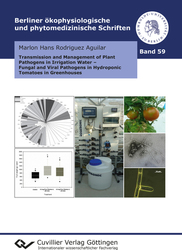| Areas | |
|---|---|
| Serie de libros (97) |
1382
|
| Nachhaltigkeit |
3
|
| Gesundheitswesen |
1
|
| Letra |
2372
|
| Ciencias Naturales |
5408
|
| Matemática | 228 |
| Informática | 320 |
| Física | 980 |
| Química | 1364 |
| Geociencias | 131 |
| Medicina humana | 243 |
| Estomatología | 10 |
| Veterinaria | 108 |
| Farmacia | 147 |
| Biología | 835 |
| Bioquímica, biología molecular, tecnología genética | 121 |
| Biofísica | 25 |
| Nutrición | 45 |
| Agricultura | 1005 |
| Silvicultura | 201 |
| Horticultura | 20 |
| Ecología y conservación de la tierra | 148 |
| Ciencias Ingeniería |
1798
|
| General |
98
|
|
Leitlinien Unfallchirurgie
5. Auflage bestellen |
|
Erweiterte Suche
Transmission and Management of Plant Pathogens in Irrigation Water (Volumen 59) (Tienda española)
Fungal and Viral Pathogens in Hydroponic Tomatoes in Greenhouses
Marlon Hans Rodriguez (Autor)Previo
Lectura de prueba, PDF (320 KB)
Indice, PDF (97 KB)
Recirculating fertigation solutions in hydroponic cultivation systems reduce production costs. They are environmentally friendly, especially because they minimize the consumption of fresh water. However, there is a high risk of epidemics due to accumulation and dispersal of plant pathogens via irrigation water. If the drain is not treated before reuse, even a few pathogens can jeopardize production and lead to high economic losses. This PhD-thesis analyzes and evaluates the eff ect of an electrolytically derived disinfectant, potassium hypochlorite (KClO), on various plant pathogens in tomato crops. In vitro and in vivo studies were conducted to determine i) the potential of the disinfectant to inactivate pathogens such as Tobacco mosaic virus and Pepino mosaic virus, Fusarium oxysporum f.sp. lycopersici and Rhizoctonia solani and ii) its suitability to prevent the spread of pathogens via fertigation solution in hydroponic tomato production.
| ISBN-13 (Impresion) | 9783689520755 |
| ISBN-13 (E-Book) | 9783689520502 |
| Formato | A5 |
| Idioma | Inglés |
| Numero de paginas | 88 |
| Laminacion de la cubierta | mate |
| Edicion | 1. |
| Serie | Berliner ökophysiologische und phytomedizinische Schriften |
| Volumen | 59 |
| Lugar de publicacion | Göttingen |
| Fecha de publicacion | 09.07.2024 |
| Clasificacion simple | Tesis doctoral |
| Area |
Agricultura
Plantación Horticultura |
| Palabras claves | water, nutrient, plant, recirculating, chlorine, disinfection, virus, pathogens, tomato, plants, recirculating, viruses, agriculture, phytophthora, hydroponic, biology, oxysporum, hydroponics, fusarium, greenhouse, greenhouses, phythium, agricultural, propagules, actahortic, technology, stanghellini, tomatoes, rhizoctonia, oxidation, hypochlorite, fungi, dispersal, diseases, potato, pepino, membrane, chlorination, Wasser, Nährstoff, Pflanze, Kreislaufführung, Chlor, Desinfektion, irrigation, Bewässerung, Krankheitserreger, Tomate, Pflanzen, Kreislaufwirtschaft, Viren, Landwirtschaft, Phytophthora, Hydroponik, Biologie, Oxysporum, Hydroponik, Fusarium, Gewächshaus, Gewächshäuser, Phythium, Landwirtschaft, Vermehrung, Aktahortik, Technologie, Stanghellini, Tomaten, Rhizoctonia, Oxidation, Hypochlorit, Pilze, Ausbreitung, Krankheiten, Kartoffel, Pepino, Membran, Chlorierung, |








